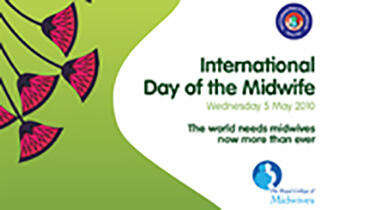
Staff in the Maternal and Newborn Health Unit (MNHU) of the Liverpool School of Tropical Medicine (LSTM) are raising awareness about morbidity and mortality in pregnancy and childbirth across the developing world, through celebrating International Day of the Midwife (IDM) on 5th May 2010. The MNHU staff at LSTM are raising funds through the sale of pin badges and cakes to help mothers and newborns in developing countries, and to help provide skilled midwifery care to women.
The MNHU continue to work with a variety of international and national partners to reduce maternal and newborn mortality and morbidity in countries with very high maternal mortality ratio through capacity building and research activities. This includes evaluation and capacity building of health workers especially midwives in Life-Saving Skills and Essential Obstetric and Newborn Care. The unit provides training, empowerment and support to midwives in Africa (Nigeria, Somaliland, Zimbabwe, Malawi, Kenya, and Sierra Leone) and Asia countries (Bangladesh, India and Pakistan) where maternal mortality is highest.
To achieve MDGs 5 and 4, all women globally should have access to good quality skilled birth attendance. This is a key indicator of progress. IDM is organised globally by the International Confederation of Midwives (ICM), and is supported in the UK by the Royal College of Midwives (RCM). As an institution dedicated to training Midwives and Skilled Birth Attendants (SBAs) to work in resource poor settings LSTM is working in partnership with the Royal College of Obstetricians & Gynaecologists (RCOG) to document the need for an increase in the numbers of skilled Midwives and SBAs in those countries suffering from the highest maternal mortality and morbidity rates.
IDM 2010 is uniting agencies to highlight the lack of skilled midwives and bring health professionals, politicians and other stakeholders together to help build support for achieving the Millennium Development Goals 5 – to Improve Maternal Health and reduce the maternal mortality ratio by three quarters and 4 to Reduce Child Mortality.
Today, the MNHU celebrates midwives all over the world and renews its support to strengthening midwifery care globally as a way to reduce maternal and newborn mortality and morbidity.
Child and Reproductive Health Unit
-ends-
For further information, please contact
Alan Hughes, Communications Manager
Office: +44 (0)151 705 3308
Mobile: +44 (0)7759 243969
Notes to Editors
The Liverpool School of Tropical Medicine (LSTM) has been engaged in the fight against infectious, debilitating and disabling diseases for more than a hundred years and continues that tradition today with a research portfolio in excess of £130 million and a teaching programme attracting students from over 70 countries.
For more information on the Maternal and Newborn Health Unit visit
http://www.liv.ac.uk/lstm/groups/crh/index.htm
The Royal College of Midwives is the voice of midwifery in the UK. The RCM promotes midwifery, quality maternity services and professional standards. They support and represent members individually and collectively in all four UK countries.
For more information visit the RCM website at www.rcm.org.uk.
The International Confederation of Midwives supports, represents and works to strengthen professional associations of midwives on a global basis. At present ICM has over 90 member associations in more than 70 countries. The ICM works with midwives and midwifery associations globally to secure women’s right and access to midwifery care before, during and after childbirth. The first international day of the midwife was launched in May 1991. For more information visit the website at:
http://www.internationalmidwives.org/Home/tabid/205/Default.aspx